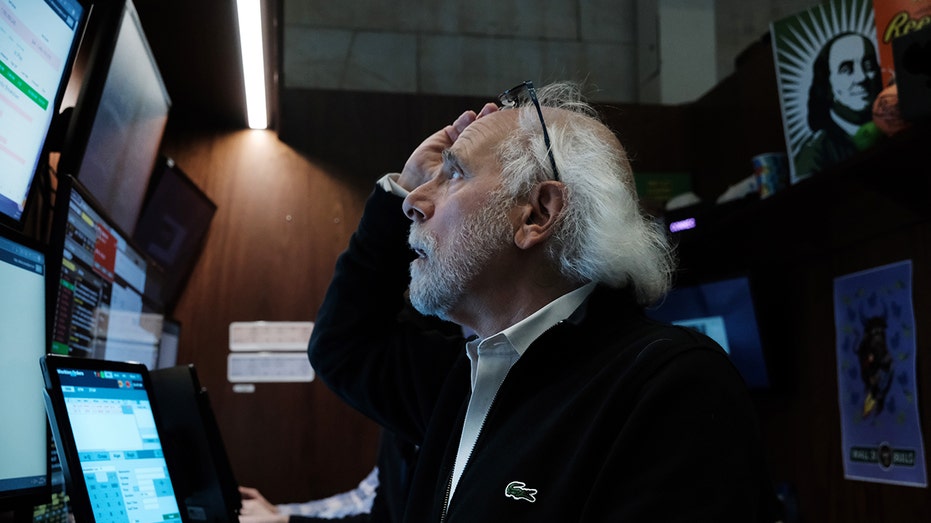S&P 500 could plunge another 20% as recession risks rise: Morgan Stanley
S&P 500 has already plunged in recent weeks as Fed rattles global markets
Former Trump economist: We can end inflation quickly if we have a fiscal response
Former Council of Economics Advisers Chairman Kevin Hassett discusses Fed Chair Powell's testimony on Capitol Hill, Biden blaming Putin for price hikes, oil executives meeting at the White House and recession risk in the U.S.
The S&P 500 has gotten crushed in a widespread sell-off this month, and the benchmark index is likely to tumble even lower if the economy falls into a recession, according to Morgan Stanley analysts.
In a recent analyst note, Morgan Stanley strategists led by Mike Wilson said the risks of a downturn have climbed considerably, and that stocks could tumble another 20% if economic growth stalls out.
"At this point, a recession is no longer just a tail risk given the Fed's predicament with inflation," Wilson wrote in the analyst note. He predicted a 35% chance of a downturn over the next year, up sharply from his previous estimate of 20%.
The index has already plunged in recent weeks as concerns over hotter-than-expected inflation, rising interest rates and a darkening economic outlook continue to weigh on the market. The S&P 500 is down about 21% from the end of 2021, officially in bear market territory, but Wilson said that markets are not actually pricing in the real threat of a recession.
FED RAISES INTEREST RATE BY 75-BASIS POINTS IN HISTORIC MOVE TO FIGHT INFLATION

Traders work on the floor of the New York Stock Exchange (NYSE) on June 10, 2022 in New York City. ((Photo by Spencer Platt/Getty Images) / Getty Images)
If the U.S. economy does indeed begin shrinking, the S&P 500 will likely drop sharply to about 3,000 – down about 20% from current levels, according to Wilson.
Even if the economy manages to escape a recession, Wilson sees more downsides for equities: The S&P benchmark is still likely to fall another 7% to 10% as markets digest what are likely to be lackluster corporate earnings.
"We recognize a lot of pain has already been inflicted during this bear market. Nevertheless, we can't yet get bullish," he said in the note. "We see a pretty poor risk reward over the next 3-6 months with recession risk rising in the face of very stubborn inflation readings."
The analyst note comes just one week after the Fed voted to raise interest rates by 75 basis points for the first time since 1994, underscoring just how serious policymakers are about tackling the inflation crisis after a string of alarming economic reports. The move puts the key benchmark federal funds rate between 1.50% and 1.75%, the highest since the pandemic began two years ago.
AS INFLATION RATE SOARS, CENTRAL PARK VISITORS SHARE HOW PRICE SURGES HAVE IMPACTED EVERYDAY LIFE

Federal Reserve Board Chair Jerome Powell is expected to testify before Congress on the economy on Thursday, June 23 2022. (AP Photo/Jose Luis Magana / Associated Press)
There are growing fears that the Fed will trigger a recession. Hiking interest rates tends to create higher rates on consumer and business loans, which slows the economy by forcing employers to cut back on spending. Bank of America, as well as Fannie Mae and Deutsche Bank, are among the Wall Street firms forecasting a downturn in the next two years.
CLICK HERE TO READ MORE ON FOX BUSINESS
Fed Chairman Jerome Powell acknowledged the U.S. central bank's war on inflation could force policymakers to raise interest rates so high they drag the U.S. economy into a recession.
"It’s certainly a possibility," Powell told lawmakers Wednesday while testifying on Capitol Hill. "We are not trying to provoke and do not think we will need to provoke a recession, but we do think it’s absolutely essential that we restore price stability, really for the benefit of the labor market, as much as anything else."





















